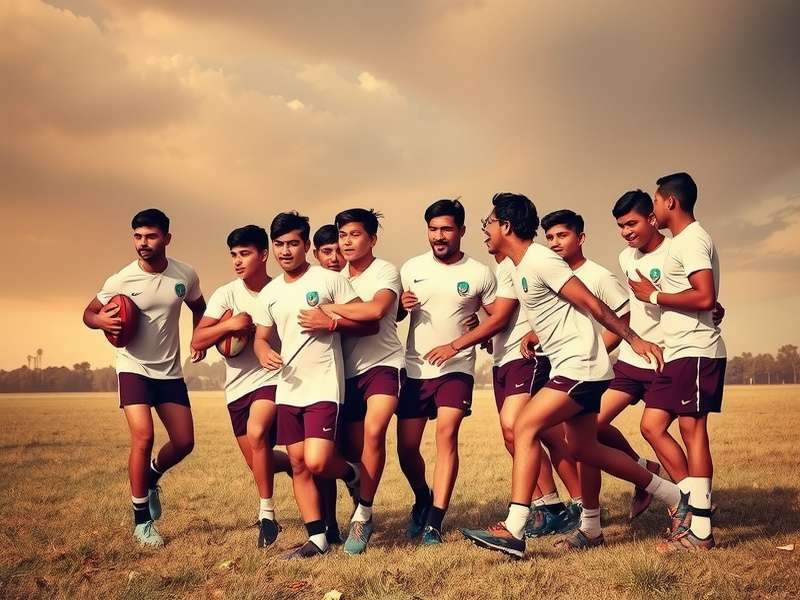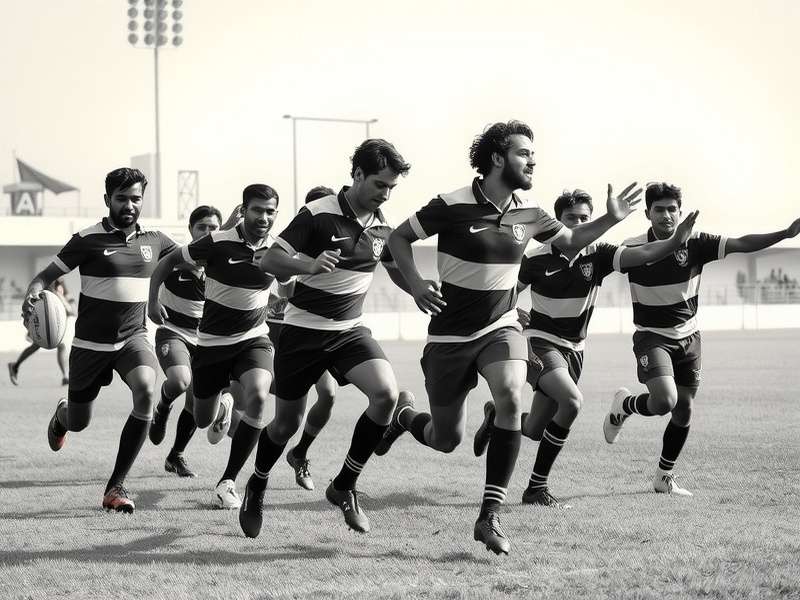Indian Rugby Trail Blazers: The Complete Encyclopedia
Discover the incredible journey of rugby in India through the stories of pioneering players and visionaries who shaped the sport against all odds.
? Historical Foundations of Indian Rugby
The story of Indian Rugby Trail Blazers begins in the colonial era when British soldiers and administrators introduced the sport to the subcontinent. Initially played exclusively by British regiments and elite clubs, rugby slowly found its way into Indian sporting culture through educational institutions and military establishments.
During the early 20th century, the first indigenous Indian players began emerging, challenging the colonial monopoly on the sport. These pioneering individuals demonstrated exceptional talent and determination, often training with makeshift equipment and overcoming significant social barriers to participate in what was then considered an elite European sport.
Historical Context: Rugby was introduced to India in the 1870s, with the first recorded match taking place in Calcutta (now Kolkata) between British regiments. The Calcutta Football Club, established in 1872, initially played rugby before switching to soccer.
The post-independence era marked a critical turning point for Indian rugby. With the departure of British players and administrators, the sport faced an existential crisis. However, a new generation of Indian Rugby Trail Blazers emerged to keep the game alive, establishing domestic competitions and forging international connections.

Throughout the 1970s and 1980s, rugby in India experienced a gradual resurgence. Clubs began forming in major cities, and inter-university competitions gained popularity. The establishment of the Indian Rugby Football Union (IRFU) in 1998 marked a significant milestone, providing the sport with an official governing body and structured development pathway.
Formative Years and Institutional Development
The institutionalization of rugby in India progressed steadily through the 1990s and early 2000s. Regional associations formed across states, creating a network that would support the sport's growth. Coaching programs, referee development, and youth initiatives began taking shape, laying the groundwork for future success.
Rugby introduced to India by British regiments, with early matches recorded in Calcutta and Bombay
First Indian players begin participating in rugby, primarily through educational institutions
Post-independence revival efforts begin with club formation in major cities
Indian Rugby Football Union (IRFU) established as the national governing body
India begins participating in international competitions with greater frequency
The dedication of these early administrators and players cannot be overstated. Working with limited resources and minimal public recognition, they preserved the sport during challenging times and created opportunities for future generations. Their legacy forms the foundation upon which modern Indian rugby continues to build.
? Pioneering Players and Visionaries
The remarkable journey of Indian Rugby Trail Blazers is embodied in the stories of individual players and administrators who defied expectations and broke barriers. These individuals demonstrated extraordinary commitment to the sport, often balancing rugby with professional careers and family responsibilities.
Nasser Hussain: The Technical Maestro
Widely regarded as one of India's most technically gifted players, Nasser Hussain's career spanned over two decades. His exceptional understanding of game strategy and leadership qualities made him a pivotal figure in Indian rugby's development. Hussain represented India in multiple Asian tournaments and later transitioned into coaching, where he continues to influence the next generation.
Rahul Bose: The Dual-Sport Phenomenon
Perhaps the most recognizable face in Indian rugby, Rahul Bose achieved the rare distinction of excelling in both rugby and acting. His athletic prowess and dedication brought unprecedented media attention to the sport in India. Bose captained the national team and represented India in international competitions, becoming an ambassador for rugby's growth in the country.
Lakshya Khanna: The Modern Trailblazer
Representing the new generation of Indian Rugby Trail Blazers, Lakshya Khanna has emerged as a dynamic force in both domestic and international competitions. His speed, agility, and tactical intelligence have made him one of India's most promising players, with notable performances in Asian Rugby tournaments.

Beyond the players, visionary administrators have played an equally crucial role in rugby's development in India. Individuals like Viren Rasquinha, former CEO of Olympic Gold Quest, and others have worked tirelessly to secure funding, develop infrastructure, and create pathways for talented athletes to pursue rugby professionally.
Women Pioneers in Indian Rugby
The growth of women's rugby represents one of the most inspiring chapters in the story of Indian rugby. Despite facing additional social and cultural barriers, female players have made remarkable strides in recent years. The establishment of the women's national team and their participation in international competitions marks a significant achievement for gender equality in Indian sports.
The contributions of these pioneering women extend beyond their on-field achievements. They have become role models and advocates for sports participation among young girls, challenging stereotypes and expanding opportunities in a traditionally male-dominated sporting landscape.
? Notable Achievements and Milestones
The journey of Indian Rugby Trail Blazers is marked by significant achievements that demonstrate the sport's growing stature in the country. While India may not yet compete with traditional rugby powerhouses, the progress made in recent decades reflects the dedication of players, coaches, and administrators.
| Year | Achievement | Significance |
|---|---|---|
| 1998 | Formation of IRFU | Establishment of national governing body |
| 2005 | First Asian Tournament Participation | India competes in Asian Rugby Championship |
| 2010 | Women's National Team Debut | Historic first international match |
| 2016 | First Professional Contracts | Players begin receiving structured financial support |
| 2019 | Asian Rugby Division Victory | Notable tournament success |
India's participation in the Asian Rugby Championship has provided valuable exposure and development opportunities. While facing established rugby nations like Japan, Hong Kong, and South Korea presents challenges, these competitions have been instrumental in raising standards and identifying areas for improvement.
International Recognition: In recent years, Indian rugby has gained increasing recognition within the global rugby community. World Rugby, the international governing body, has provided development funding and technical support to accelerate growth initiatives across the country.
Domestically, the establishment of structured competitions has been a critical achievement. The National Rugby Championship, University Rugby Championships, and various age-grade tournaments have created a competitive pathway for aspiring players. These events have also helped identify talent for national team selection.

Grassroots Development Successes
Perhaps the most significant achievement of Indian rugby has been the expansion of grassroots programs. Initiatives like "Get Into Rugby" have introduced thousands of children to the sport, creating a broader participant base and changing perceptions about rugby's accessibility.
School and college programs have expanded considerably, with rugby now being played in educational institutions across multiple states. These developments are crucial for long-term sustainability, ensuring a continuous pipeline of talent and fostering a rugby culture from an early age.
The establishment of rugby academies in key locations represents another important milestone. These specialized training centers provide professional coaching and development pathways, helping to bridge the gap between recreational participation and competitive excellence.
? Development Pathways and Infrastructure
The systematic development of rugby in India has been a key focus for the Indian Rugby Trail Blazers and administrative bodies. Creating sustainable structures that support player development from grassroots to elite levels has required strategic planning and significant investment.
Coaching and Officiating Development
A critical component of rugby's growth in India has been the development of local coaching expertise. Initially reliant on foreign coaches and technical experts, India has progressively built its own cadre of qualified coaches through certification programs and knowledge-sharing initiatives.
The referee development pathway has similarly evolved, with Indian officials now officiating in domestic competitions and gradually gaining international exposure. This professionalization of support roles has been essential for raising competitive standards and ensuring the integrity of competitions.
Infrastructure and Facilities
Infrastructure development has presented both challenges and opportunities for Indian rugby. The limited availability of dedicated rugby pitches has necessitated creative solutions, including ground-sharing arrangements with other sports and the development of multi-purpose facilities.
Recent years have seen improvements in training facilities, with the establishment of dedicated rugby centers in key locations. These facilities provide players with access to professional-grade equipment, recovery resources, and sports science support previously unavailable.
Key Rugby Hubs
- Delhi National Capital Region
- Kolkata and West Bengal
- Mumbai and Maharashtra
- Bangalore and Karnataka
- Bhubaneswar and Odisha
Major Domestic Competitions
- National Rugby Championship
- All India University Rugby
- Senior State Championships
- Youth Rugby Festivals
- Corporate Rugby League
Talent Identification and Nurturing
The establishment of systematic talent identification mechanisms has been transformative for Indian rugby. Scouting networks now operate across multiple states, identifying promising players and providing them with specialized development opportunities.
Elite player pathways have been created to support the most talented individuals, offering access to advanced coaching, competition exposure, and sports science support. These pathways are crucial for developing players capable of competing at international level.
Partnerships with educational institutions have been instrumental in talent development. University rugby programs offer student-athletes the opportunity to combine academic pursuits with high-level training, addressing the challenge of career security that often deters sports participation in India.
? Future Prospects and Strategic Vision
The future of Indian Rugby Trail Blazers appears promising, with strategic initiatives aimed at accelerating growth and increasing competitiveness. Building on the foundations laid by previous generations, current administrators are implementing ambitious development plans.
High Performance Objectives
India's rugby leadership has established clear performance targets for the coming years. These include improving continental rankings, qualifying for premier Asian competitions, and developing players capable of competing in professional leagues internationally.
The establishment of centralized training programs represents a significant step forward. By bringing together the nation's most promising players for intensive training blocks, these initiatives aim to accelerate development and build cohesive national teams.
Olympic Aspirations: With rugby sevens now an Olympic sport, India has set qualification for future Games as a strategic priority. This ambition is driving investment in sevens rugby and the identification of athletes with the specific attributes required for the abbreviated format.
Grassroots Expansion Strategy
The planned expansion of grassroots programs aims to significantly increase participation numbers across all demographics. Targeting schools in non-traditional rugby regions and developing simplified versions of the game for introductory purposes are key components of this strategy.
Digital engagement initiatives are being developed to complement on-ground programs. Online resources, virtual coaching, and digital communities aim to support players and coaches in regions with limited access to physical infrastructure.

Commercial Development and Sustainability
Enhancing the commercial viability of rugby in India remains a priority. Efforts to secure sponsorship, broadcast coverage, and ticketing revenue are essential for creating a sustainable ecosystem that reduces dependence on limited government and international funding.
The development of a domestic professional league represents a long-term aspiration. While challenging in the current sporting landscape, such a competition would provide employment opportunities for players, stimulate fan engagement, and raise the sport's profile.
International Collaboration
Strategic partnerships with established rugby nations continue to play a vital role in India's development. Technical exchanges, coaching secondments, and competition opportunities provide valuable learning experiences and help benchmark progress against international standards.
Membership in regional rugby bodies ensures India's voice is heard in governance discussions and provides access to development resources. Active participation in the Asian rugby community also creates regular competition opportunities essential for player development.
The story of Indian Rugby Trail Blazers is one of perseverance, passion, and gradual progress. While challenges remain, the dedication of individuals across all levels of the sport continues to drive Indian rugby forward, creating optimism for the future and inspiring the next generation of players and administrators.
? Comprehensive Reference Section
Key Terminology
IRFU: Indian Rugby Football Union, the national governing body for rugby in India
Asian Rugby: The continental governing body for rugby in Asia
Rugby Sevens: A variant of rugby union with seven players per side
Get Into Rugby: World Rugby's global participation program
National Rugby Championship: India's premier domestic competition
Trail Blazers: Pioneering individuals who established rugby in India